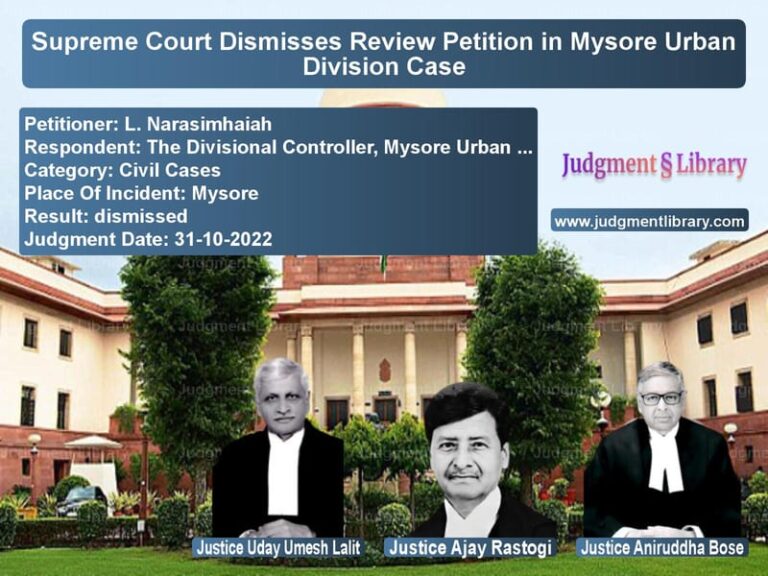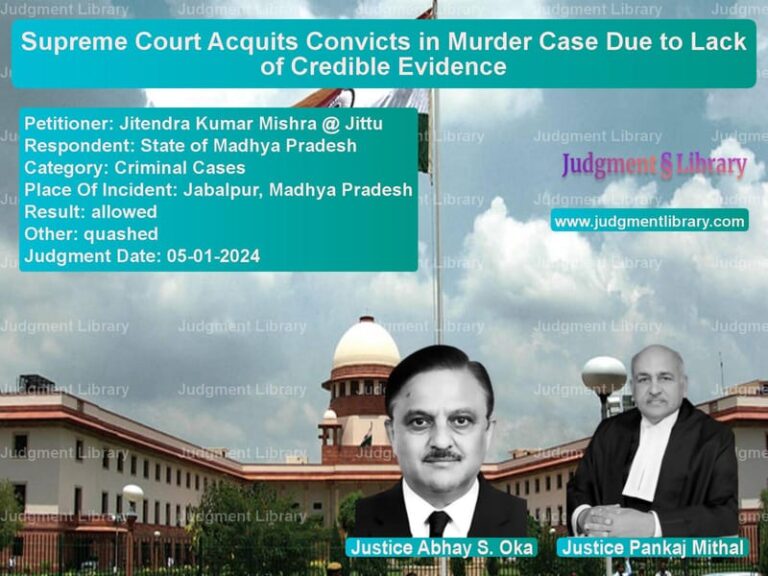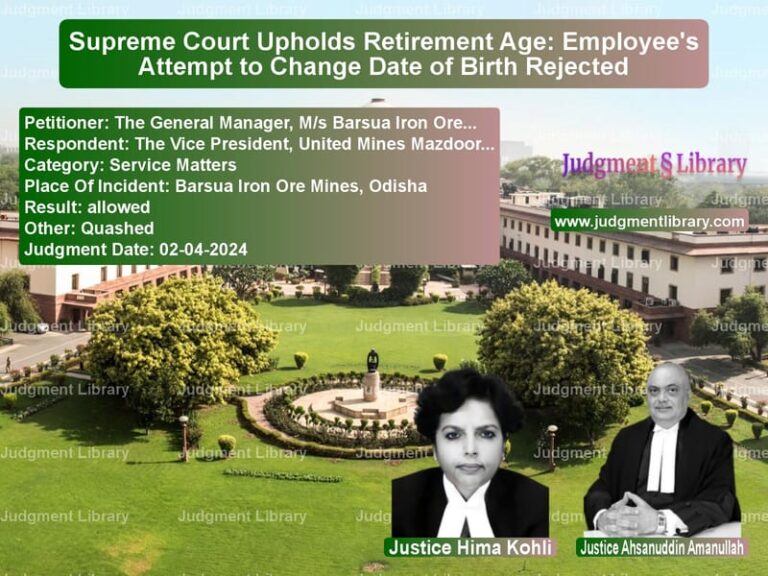Supreme Court Expands Jurisdiction for Women to File 498A Cases
The Supreme Court of India, in the case of Rupali Devi v. State of Uttar Pradesh & Ors., ruled that a woman subjected to cruelty under Section 498A of the Indian Penal Code (IPC) can file a case at her parental home even if the cruelty occurred in the matrimonial home. This landmark judgment expands the jurisdictional reach of courts to ensure greater legal access for women facing domestic abuse.
Background of the Case
The case arose from multiple appeals challenging the jurisdiction of courts to entertain complaints under Section 498A IPC in locations where the woman takes shelter after leaving her matrimonial home. The key question before the Court was:
“Whether a woman forced to leave her matrimonial home due to cruelty can initiate proceedings under Section 498A IPC in the jurisdiction of the courts where she has taken shelter with her parents or family members?”
Previous judicial precedents had conflicting views on whether such jurisdiction extended to the parental home. This case was referred to a larger bench to settle the issue.
Petitioners’ Arguments
- The appellants argued that jurisdiction under Section 498A IPC should be confined to the place where the alleged cruelty occurred, i.e., the matrimonial home.
- They cited earlier judgments, such as Y. Abraham Ajith v. Inspector of Police (2004) and Ramesh v. State of Tamil Nadu (2005), which held that proceedings cannot be initiated in the parental home unless an overt act of cruelty took place there.
- The appellants claimed that extending jurisdiction to parental homes would result in forum shopping and harassment of the accused.
Respondents’ Arguments
- The respondents contended that cruelty under Section 498A IPC includes both physical and mental abuse, and the mental trauma persists even after the woman leaves her matrimonial home.
- They cited cases such as Sujata Mukherjee v. Prashant Kumar Mukherjee (1997) and Sunita Kumari Kashyap v. State of Bihar (2011), where it was held that jurisdiction extends to places where the consequences of cruelty ensue.
- The respondents argued that mental cruelty is a continuing offense, and its effects remain with the woman even in her parental home.
Supreme Court’s Observations
The Supreme Court, in a judgment authored by Chief Justice Ranjan Gogoi and Justices L. Nageswara Rao and Sanjay Kishan Kaul, analyzed the scope of Sections 177, 178, and 179 of the Code of Criminal Procedure (CrPC) to determine jurisdiction.
1. Interpretation of Section 498A IPC
The Court noted that ‘cruelty’ under Section 498A IPC is not limited to physical violence but also includes mental harassment. It ruled:
“Mental trauma and psychological distress caused by acts of cruelty continue even after the woman leaves the matrimonial home and takes shelter elsewhere.”
2. Section 179 CrPC and the Consequences of Cruelty
The Court invoked Section 179 of CrPC, which states that an offense can be tried where the act was committed or where its consequences ensue.
“The adverse effects on the mental health of the wife, even if attributable to acts committed in the matrimonial home, amount to distinct offenses that continue in the parental home.”
3. Domestic Violence Act as a Parallel Legal Framework
The Court acknowledged the Protection of Women from Domestic Violence Act, 2005 as a parallel legal framework that recognizes emotional abuse and psychological distress as continuing offenses.
4. Expanding Access to Justice
The Court emphasized that limiting jurisdiction to the matrimonial home would prevent many women from seeking justice, as they often take refuge far from where the abuse occurred.
“Women forced to leave their matrimonial home due to cruelty should not be left remediless simply because of restrictive jurisdictional rules.”
Final Judgment
The Supreme Court held:
- Jurisdiction for filing cases under Section 498A IPC extends to the parental home or any place where the woman resides after facing cruelty.
- The adverse mental effects of cruelty constitute a continuing offense under Section 179 CrPC.
- The ruling applies prospectively and retrospectively to pending cases.
“We hold that courts at the place where the wife takes shelter after leaving or being driven away from the matrimonial home, on account of acts of cruelty, would have jurisdiction to entertain a complaint under Section 498A IPC.”
Key Takeaways
- Extended Jurisdiction for Domestic Violence Cases: Women can now file 498A IPC cases in their parental home or any place where they reside after facing cruelty.
- Recognition of Mental Cruelty as a Continuing Offense: The judgment acknowledges that the psychological impact of domestic violence persists even after a woman leaves her matrimonial home.
- Application of Section 179 CrPC: The ruling confirms that consequences of cruelty occurring in another jurisdiction allow courts in that jurisdiction to take cognizance.
- Access to Justice Strengthened: This decision empowers women by removing jurisdictional barriers to filing complaints.
Conclusion
The Supreme Court’s ruling in Rupali Devi v. State of Uttar Pradesh & Ors. is a landmark judgment that expands the scope of legal remedies for women facing domestic violence. By allowing cases to be filed in the parental home, the Court ensures greater access to justice and strengthens protections for survivors of domestic abuse.
Petitioner Name: Rupali Devi.Respondent Name: State of Uttar Pradesh & Ors..Judgment By: Justice Ranjan Gogoi, Justice L. Nageswara Rao, Justice Sanjay Kishan Kaul.Place Of Incident: Uttar Pradesh.Judgment Date: 09-04-2019.
Don’t miss out on the full details! Download the complete judgment in PDF format below and gain valuable insights instantly!
Download Judgment: Rupali Devi vs State of Uttar Prade Supreme Court of India Judgment Dated 09-04-2019.pdf
Direct Downlaod Judgment: Direct downlaod this Judgment
See all petitions in Domestic Violence
See all petitions in SC/ST Act Case
See all petitions in Judgment by Ranjan Gogoi
See all petitions in Judgment by L. Nageswara Rao
See all petitions in Judgment by Sanjay Kishan Kaul
See all petitions in allowed
See all petitions in supreme court of India judgments April 2019
See all petitions in 2019 judgments
See all posts in Criminal Cases Category
See all allowed petitions in Criminal Cases Category
See all Dismissed petitions in Criminal Cases Category
See all partially allowed petitions in Criminal Cases Category







